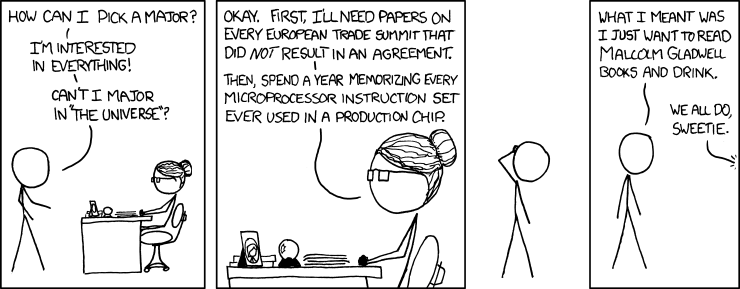Collegiate Learning
« previous post | next post »
The latest xkcd:
Mouseover title: "I hear Steven Levitt is writing a book analyzing A.J. Jacobs' quest to spend a year reading everything Malcolm Gladwell ever wrote. The audiobook will be narrated by Robert Krulwich of Radiolab."
(As usual, click on the image for a larger version.)
Performance task: You are an academic administrator at an American university. Read some background material about the Collegiate Learning Assessment, the recent book Academically Adrift, and some of the the responses to it.
Please prepare a memo that addresses the question of how your institution should deal with this controversy, considering both the public-relations aspect and also the meaning (if any) of the CLA numbers. Include a discussion of test reliability, paying specific attention to the role of motivation in test outcomes, and the expected change in student motivation from freshman to senior year, especially in the case of tests whose results are used to evaluate institutions and not individual students. Finally, consider the relationship between the attitudes satirized in the cartoon and the testing philosophy of the College Learning Assessment, including the fact that the Malcolm Gladwell Book Generator has gone viral.
Click here to learn more about the definitions of the skills assessed by the CLA and the criteria used for scoring the CLA measures.

Tim Silverman said,
February 21, 2011 @ 11:59 am
Hmph, significance—statisical and non-statistical—once again. The message that goes out to the public is "The teaching is so crappy that 45% of students learn nothing significant," when the real meaning of the survey is "The test is so crappy that for 45% of students, it tells us nothing significant about their learning."
Leonardo Boiko said,
February 21, 2011 @ 12:37 pm
The Malcolm Gladwell Book Generator appears to not be a generator at all.
[(myl) Come now, cyclic selection from a finite list is a form of generation…]
Oskar said,
February 21, 2011 @ 2:11 pm
Especially since actual generators are cyclic. In the sense that they… you know… spin around a lot.
chris said,
February 21, 2011 @ 3:02 pm
Maybe if I drank *before* reading Malcolm Gladwell books, they would seem more impressive. As it is, I mostly get the impression that people who are trying to do real social sciences are probably annoyed that someone like Gladwell exists at all, let alone that he receives more media attention than their entire field.
WillSteed said,
February 21, 2011 @ 10:16 pm
They argue that X% did not improve their skills across Y time period. I hope this takes into account that some of them likely did not need much improvement to be well ahead of their peers. Many students come to university already able to critique the logic of arguments and create their own logical arguments.
Tim Silverman's comment also applies – has the test been tested?
I haven't noticed a large difference between standards when I was an undergraduate and now, short time frame though that is (just a decade).
Catanea said,
February 22, 2011 @ 5:58 pm
Gosh, you threw me there. I thought CLA was Codices Latini Antiquiores.
Iain said,
February 28, 2011 @ 12:26 am
I was actually a college student who participated in the CLA, and I can tell you first-hand that most of my friends who participated cared less and less about the test each time they took it, making it a highly ineffective tool. Some of these students wrote answers that they knew were blatantly wrong just to stick it to the test's writers. Others ignored the prompts entirely and wrote logical and well-constructed essays about the ineffectiveness of standardized tests as a means of measuring anything.
Hermann Burchard said,
June 22, 2011 @ 6:34 pm
Very slightly on topic, I had never heard of Malcolm Gladwell before reading this blog, and am certainly saddened that his books, none of which I have read, are thought unimpressive by commenters. However, the cartoon did make me curious so I read up about MG on Wikipedia, and also about "thin-slicing." There, a curious bunch of typos caught my attention:
. . research in the courtroom has shown that brief experts of judges' instructors to jurors in trials, raters could predict the judge's expectations for the trial.
Intentional mischief? Editing typos:
. . research in the courtroom has shown that [based on] brief excerpts of judges' instructions to jurors in trials, raters could predict the judge's expectations for the trial.